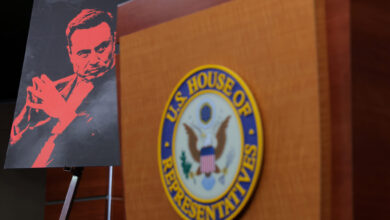Inflation is down to 2.1%, but Trump’s policies should have it blasting off again lickety-split • Nevada Current

Poll after poll has found that the economy, and specifically higher costs, are the leading concern of most Nevada voters.
Donald Trump’s mass deportation plan would not only be horrendous for families. Its many disastrous economic impacts would include higher prices for goods, services, and housing.
Another key Trump campaign promise – tariffs that slap massive tax increases on imported goods – would also be inflationary.
It’s little wonder that Republican Senate candidate Sam Brown dodges and darts every time he’s asked about mass deportation.
And Drew Johnson, the Republican running in Nevada’s always competitive third congressional district, has asserted “tariffs that hit consumer products are just another unfair tax.”
A key measure of inflation, the one the Fed uses to determine whether to raise or lower interest rates, came in at 2.1% Thursday.
The inflation rate has been falling for more than two years.
Trump’s policies will make it start rising again.
A Nevada electorate that says its top concern is higher prices might be expected to soundly and roundly reject Trump.
Yet with Election Day nearly upon us, polls indicate the race between Trump and Kamala Harris in Nevada, as in all the battleground states, is tied.
Many casual, less-engaged voters don’t like Trump as a person at all and want nothing to do with the vulgarity of his campaign, yet are voting for him anyway on the chance that he might render unto them low low prices.
What those voters hear or know about the economy is informed first and foremost by their lived experience: stuff, including rent, is a lot more expensive than when Trump was president.
It’s not unreasonable for them to assume that maybe Trump had something to do with that, and that given the chance, maybe he’ll make prices low again.
Much of the national mainstream media, whom Trump has lumped in with the “enemy from within,” and against whom he has vowed vengeance, has weirdly been a reliable ally in aide of Trump’s claim that he’ll fulfill voters’ wishes of low low prices.
During the 2024 campaign there has been a lot of good reporting placing the economy in a deservedly broad and informed context.
Unfortunately, there has been a lot more lazy economic coverage, especially in campaign stories, that has helped establish narratives unjustifiably favorable to Trump.
From Great Recession to ‘envy of the world’
Wage growth has outpaced inflation, and in job growth and GDP growth as well, the U.S. recovery from the pandemic was much faster and stronger than its recovery from the Great Recession.
That’s in large part thanks to legislation passed by Democrats in Congress and signed into law by Joe Biden in 2021 and 2022.
The U.S. recovery from the pandemic has been by far the strongest of the world’s largest advanced economies and, as The Economist magazine dubbed it in a special section earlier this month, “the envy of the world” that “has left other rich countries in the dust.”
But since inflation started rising in 2021, spiking at 9.1% in June of 2022 before dropping to the current 2.1%, context about the U.S. economic recovery from the pandemic has rarely been included in the thousands of stories chronicling voters complaining about the price of things.
The press appears almost afraid to acknowledge the U.S. economy’s recovery from the pandemic was faster and more robust than hardly anyone thought possible when they were voting for a president four years ago.
And if omission means leaving people with warm but unwarranted nostalgia for Trump’s economic policies, well, that’s not the media’s problem, now is it?
There have been exceptions of course, but press accounts for years have routinely have been as nostalgic as casual voters, waxing dreamily about the Trump-era economy.
Shoved to the edge of the narrative – if included it at all – has been the fact that the economy during Trump’s presidency, while temporarily goosed by his rich people tax cuts, was on a more fundamental level the result of an economy finally recovering in earnest from the Great Recession – a recovery that was solidly underway before Trump became president.
The high cost of normalizing the abnormal
Biden’s economic stimulus legislation was deliberately much larger and more aggressive than Barack Obama’s program to help the economy recover after capitalism tried to commit suicide by deregulation in 2007-08.
And thankfully so.
Obama’s recovery plan was way too small. And way too much of it was frittered away on tax cuts, because Obama was way too obsessed with bending over backwards in the delusional hope that he might please a Republican member of Congress some day.
The long hard slog of a recovery from the Great Recession wasn’t helped by state policymakers. In Nevada, Gov. Jim Gibbons and his successor, Gov. Brian Sandoval, were both hell-bent on cutting spending at a time when the economy needed to be stimulated.
But in 2016, as Obama’s second term was winding down, the nation’s economy, and hence Nevada’s, finally began rebounding in earnest.
The economy would have continued to perform strongly in 2017 through 2019 – Trump’s purported glory days – whether the president had been Trump or Hillary Clinton. Or Jeb Bush, or Bernie Sanders, or a potted fern.
But the economic narrative dominating the politics of 2024 has been driven by the blithe assumption that the pre-pandemic economy people remember fondly was Trump’s doing, instead of something that happened while he was president.
Nevada only has six electoral college votes, so Trump could win Nevada and lose the presidency. Or he could lose Nevada and win the presidency, which is what happened in 2016.
That the race is even this close in Nevada and the nation is testament to, well, a lot of awful things.
One of those things is a critical mass of the national press taking the path of least resistance, and failing to fairly and accurately explain the economy.
The media has botched their coverage of Trump from the moment he rode down his escalator. They’ve normalized him yet again during the 2024 race, on multiple fronts in multiple ways, including while reporting on the role of prices in the election.
It would be nice if we could just shrug and say, eh, that’s the media’s problem. But everybody could be paying the price. Which for many things could be considerably higher.




